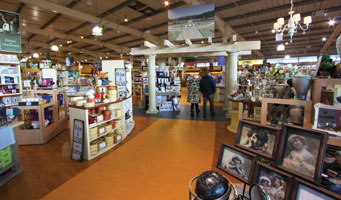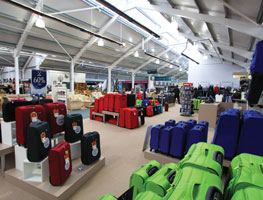1/31/2014
My. How They've Changed
Chris Beytes
Photography by Chris Beytes

English garden centers have long had the reputation for being some of the best in the world. Why? England’s strong gardening culture and tradition, a relatively mild climate (conducive to year-round sales) and less pressure from big-box retailers. And they’ve always been a hub of the community, especially as a cozy place for lunch or a spot of tea.
That’s what I found when making my first tour of English garden centers in 2004. Late in 2013 I made another such tour, visiting 16 centers in seven days. I’d found that much of the mom-and-pop individualism I’d seen on my earlier trip had given way to a new level of professional, multi-store chains that today own most garden centers. But at the same time I saw more non-gardening merchandise for sale, such as clothes, gifts, housewares and food. It was puzzling. Are these still garden centers?
Pictured: Garden center or general merchandise retailer? At Trentham Garden Centre, as at many English garden centers, the answer is “both.”
So at my last stop, Millbrook Garden Company, which has three locations south of London, I sat down in their café with owners Sue Allen and her daughter, Tammy Woodhouse, along with Tammy’s husband and Millbrook’s financial director, Ben, and asked them to explain the changes I’d spotted during my travels.
Green Profit: The garden centers I visited all have a modern, upscale look, more like [department store] Marks & Spencer than a garden retailer, with product categories to match. Why is that?
Sue Allen: “I think in England, from many years ago, people who did start to make money in garden centers plowed that money back into improving the centers. … The confidence is there now with investors, and so you do have the opportunity to make them bigger and better, more modern, more commercial.”
Tammy Woodhouse: “One of the things we’ve been looking at is how do we become less weather-dependent. And the way a lot of the really big guys have gone is actually less gardening, more lifestyle, more gift, housewares, kitchenware, farm shops, bigger cafes.
GP: Then are they still “garden centers?”
Ben Woodhouse: “That’s what they’re still called, but it’s changing people’s perception of a garden center. Now they expect to find clothing, food, books, gifts, a good café, potentially a farm [fresh food] shop.”
Sue: “Some of the big guys will now call themselves ‘Smith’s Home & Garden’ or ‘Smith Garden & Leisure,’ so they’re perhaps getting away from that ‘garden center’ name. They’re becoming more destinations.”
GP: What happened to the quirky mom-and-pop garden centers I saw in 2004?
Tammy: “The uniqueness still comes from the really small growers and nurseries. I think the guys in the middle are getting squeezed out. They’re either getting taken over or they’re too small to be sustainable. It’s the really small people who are really niche, or you’re probably going to go really big, or be part of a big chain.”

Pictured: Tammy, Ben, Sue and her daughter, Kirsty Mauritz, all directors at Millbrook Garden Company.
GP: Cafés have definitely gotten bigger and better since my last visit.
Sue: “It guarantees a footfall for the rest of your shop. And people, even through the economically hard times in England, didn’t seem to stop spending money on going out to eat.”
Ben: “Catering, when you get it right, is [a money-maker]. But it’s got lots of other headaches.”
GP: All these large departments featuring clothes, shoes, candles, scents, even luggage—are these franchises?
Tammy: “You get rent and a top-up [bonus payments if they hit certain targets].”
Ben: “It’s a way of getting guaranteed income through the low times.”
GP: Some garden centers, such as Bridgemere Nursery & Garden World, seem to have whole buildings just for renting out to these franchises.
Tammy: “[Bridgemere is part of] The Garden Centre Group—massive [139 stores]. I think about half of their retail space is now franchised out. So they are [selling] gardening, but it’s getting smaller. They want the rent.”
Ben: “They’re landlords, basically.”
GP: Millbrook is still independent. But I understand that most garden centers now belong to chains?
Ben: “There’s definitely major consolidation going on. The little chains are buying the odd [small] one, and the big chains are buying up the big centers.”
Tammy: “In five years time the industry will look completely different. We’re going through a massive change. A lot of family businesses are going away.”
GP: With so many garden centers now belonging to chains, there was a lot of sameness to the merchandising. Nice, but boring.
Ben: “There probably is a move to the bigger corporate thing where they don’t have enough staff to do posh displays.”
Sue: “It’s all about merchandising, rather than the display, really.”
GP: The most annoying thing I saw all week were displays featuring “as-seen-on-TV” merchandise with a TV screen playing an infomercial over and over. They were everywhere. You’ve even got them here! What’s that all about?
Ben: You wouldn’t believe how well they sell.
Sue (laughing): “I despise them. But [product] flies off them.”
 Pictured: Bridgemere Nursery & Garden World has entire buildings dedicated to franchised non-garden products.
Pictured: Bridgemere Nursery & Garden World has entire buildings dedicated to franchised non-garden products.
Tammy: “They go against the grain completely. We hate them. But the money they take is unbelievable.”
Ben: “And if you look at the sales—if someone forgets to turn the monitor on in the morning, or for a week, you notice the drop in sales. It’s unbelievable.
“It’s a company who does the lot. You’ll get different things. Once you run out of one thing they bring something completely different in and put the new infomercial in. We get the margin on the production, just like it’s a normal supplier.”
(Sue looks at Tammy): “It took you a long time to be browbeaten into having them, but they work, don’t they? They do work.”
GP: The specialty food category seems to be enormous.
Tammy: “Ridiculously so. I mean, we do a little bit of it all year, but at Christmas it goes mad. All the posh tins of biscuits, stollen from Germany, all that stuff is huge and it’s really growing.”
Sue: “Yes, but also lots of garden centers are really, really focusing on local as well. Locally grown, locally produced. Really focusing on that as a benefit for the customer.
“And it relies a lot on impulse. People just picking them up because they see them while they’re here. The same way people pick up plants when they’re in the supermarket.”
GP: So much of what I saw is non-garden related, which is troublesome to me. However, it is late November—not exactly gardening season. If I come back in May or June … ?
Tammy: “It will look like a garden center, we promise!”
GP